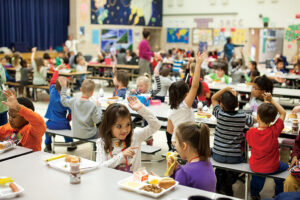Authored by:

Gurpinder Lalli
is Senior Lecturer in Education and a member of the Education Observatory Research Centre at University of Wolverhampton. He is a teacher by background. After completing a PhD at University of Leicester, he lectured in Education and Sociology. He is author of Schools, Food and Social Learning published in 2019 by Routledge
Many schools see pupil mealtime as an opportunity for useful social interaction – as well as nutrition
What do we mean by ‘social learning?’
School meals have received much attention in the press during the global pandemic and we have witnessed sharp decisions by government and also u-turns following protest. School meals are not simply about what pupils consume, they are also about sociality: how pupils eat and with whom. ‘Social learning’ is quite a problematic term given its collocation with social skills, yet these are the very skills that schools try to develop in pupils. Preparing children and young people for life beyond the school gates means more could always be done to help develop socially positive behaviours. The school dining hall is a particularly interesting space to foster such development.
In order to participate and ‘get on’ in society, close attention to the way we socialise with others is crucial. Not only does this help to establish new relationships, it also allows for the development of existing relationships. Children learn from one another during mealtime, not just in terms of food choices, but in relation to forging positive social behaviours. Therefore, staff in schools – which include midday supervisors, administration, teachers, teaching assistants and leadership – have a crucial role in fostering such development, because behaviours are modelled on a daily basis, not just between staff and pupils, but also between staff with their colleagues, and pupils with their peers.
Why does the social aspect of school mealtime matter?
Research on children’s health continues to grow as we recognise the importance of wellbeing: the pandemic has only heightened this awareness. Yet the social benefits of mealtime are not necessarily ‘seen’: meals can create interactions that affect children’s everyday development. We know that school mealtime is a universal occasion, whether packed lunches are consumed, or whether a school meal service is in place. A recent article Guardian article highlights the impact of social interaction at school on children’s wellbeing.

Photo by ‘Bread for the World’
“One of the things that concerns me most is that for some children, school is one of the key focal points in their lives, giving them stability, meaning, self-worth, esteem. It is school that gives them a purpose.
“For some children, they are perhaps not getting that from home. What they get from schools is secure relationships and secure attachments and for some kids that is with their teacher. For psychologists that is vitally important.” But all would be affected by the disruption to the normal patterns of their lives and lack of social interaction with peer groups. “When children are not with each other, not with friends, they are not learning how to interact. Much of this is done in the playground,”
What we have learned from researching school food spaces is that mealtimes have a behavioural impact in terms of modelling. But a deeper psychological impact in terms of daily social experiences and wellbeing. Our study, conducted over a 4 year period, notes how existing research tends to focus on consumption in relation to what is being served. Whilst consumption practices are of paramount importance, children’s lived social experiences also need to be considered, because they can reveal much about the developmental importance of such spaces. One English school teacher highlighted for us how social interactions during mealtime benefit children’s lives.
..it’s also being together and being sociable and eating together, they are learning other things, they are learning social skills and I think that’s one of the main drives to creating the restaurant to allow them to be socialized. Some of the pupils have difficulty with socialisation and it’s trying to get them and gain establish patterns of behaviour’
School mealtime: Community forum or surveillance mechanism?
In our paper we urge school meals to be considered as social events and communal gatherings, rather than just in terms of health and nutrition. We highlight how teaching staff understand this social learning. Often their involvement appears to be on enforcing rules and regulations during mealtime, as opposed to using the time for conversation – encounters which may have a positive impact on children and young people’s mealtime experience. So, the school meal can typically appear as a site of power, control and surveillance, as opposed to one that is conducive for socializing. The space is designed for young people, yet we (including myself as an ex-teacher) risk governing such spaces so as to take away the social aspect of eating. For instance, children often commented to us on being bullied during mealtime and not being able to finish their food due to the rush of allowing other year groups to enter. Children and young people do not necessarily all start from the same position in terms of social competence, so we do need to pay close attention to their social development by considering mealtime as one relevant learning occasion.
In short, our research contribution has been to take seriously the social aspect of the school meal. A traditional vision of an everyday meal may suggest a family sitting around a table sharing something home cooked. But children are spending more of their daytime hours in institutional settings such as the school. Therefore, it is important that such settings to ensure pupils have adequate opportunities for rich but informal interactions with others: meal time can thereby be an important social part of the day.
‘Sociality’ has been prominent in my own research, stressing how sharing meals entails a social construction. So, in recognizing the potential of such occasions it is right to question why schools (or governments) continue to reduce spaces for eating. Of course, a growing pupil population means schools are now under pressures of space: one of the spaces which can be overlooked is the dining hall. School mealtime is heavily monitored, given its routinized nature. The surveillance that shapes day to day mealtimes can resist opportunities for social learning. Therefore, less patrolling of such spaces may prove useful. While engaging there with pupils in a social manner could develop skills conducive to much life outside of the school gates.
Recommendations from observing meals
This reflective report highlights the importance of social interactions around school meals – at a time where such social activity has been sadly restricted. These ideas from our study also resonate with a number of other projects carried out in English schools. Moving forward, more attention could be given to the following possibilities:
- To consider mealtime as a teaching occasion
- A whole school approach to food curriculum reform in line with Part One of the National Food Strategy (2020).
- Focused training for staff who are on duty during at mealtimes
- Seeking opportunities to engage with those not participating socially during mealtime
- Creating an inviting space in order to foster positive eating behaviours, in line with the School Food Plan (2013).
- To model positive behaviours and engage in discussions with pupils
[A .pdf version of this article is available here]
Authored by:

Gurpinder Lalli
is Senior Lecturer in Education and a member of the Education Observatory Research Centre at University of Wolverhampton. He is a teacher by background. After completing a PhD at University of Leicester, he lectured in Education and Sociology. He is author of Schools, Food and Social Learning published in 2019 by Routledge
Leave a Reply